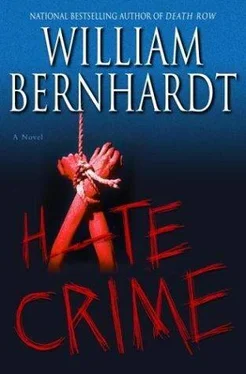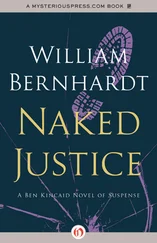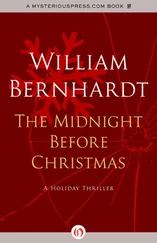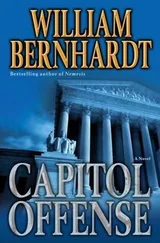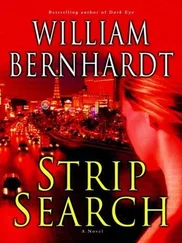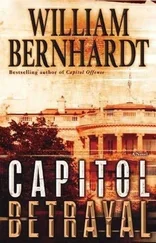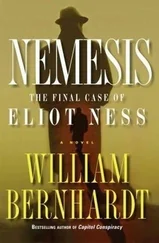Only one person sat behind the defendant’s table by choice. And Ben had spent the entire morning studiously trying to avoid eye contact with her.
“They were driven by one motive and one motive alone,” Drabble continued. “Blind, unreasoning hate. Hate born of fear, of ignorance. The same kind of hate that sent six million Jews to the gas chamber. The same kind of hate that killed 168 people at the Murrah Building in Oklahoma City. The same kind of hate that killed thousands at the World Trade Center. The kind of hate that cannot be tolerated in any civilized society.”
Vicki, the new intern, whispered into Ben’s ear. “This seems unduly inflammatory. Are we going to let him get away with this?”
Ben eyed Christina carefully. They were both tempted to object-this was pretty over-the-top. But Kevin Mahoney had told them that Judge Lacayo was usually lenient about what he’d allow in openings and closings. And they couldn’t deny that this was a hate crime-a critical part of their strategy was to acknowledge up front what Johnny had done, and what he had not done. They both decided to let it pass.
“This is what they did,” Drabble continued, his voice darkening. “First, they beat him mercilessly, giving him no chance to defend himself or escape. Then they used a Taser to torture him. Then they cut him. With a knife. And finally, when Tony must have felt that he couldn’t possibly feel any more pain, when he was crying out for mercy, they put wooden blocks under his knees and ankles, took a five-pound iron maul hammer and shattered his legs-first his left, and then, after the initial shock wave of pain had subsided, the right.”
Ben checked Johnny’s expression. He was holding up pretty well, all things considered. He’d been a wreck when the marshals brought him into the courtroom this morning. Crying like a baby, shaking visibly, begging for help. Christina had taken him to a rest room to scrub him up and get him back in control before the jury arrived. She’d been largely successful, though he had no idea how she’d managed it. No one was going to leave this trial with a good impression of the kid, but at least now he didn’t look like guilt incarnate.
Ben wondered what was going through Johnny’s mind as he heard the DA recount the list of horribles in which he had participated. Was he remorseful? Ashamed? Or was he secretly proud of himself, of what he had done in the name of his holy cause?
“Do you know what it feels like to have a thousand volts of electricity run through your body?” Drabble asked. “It isn’t pleasant. Your legs turn to rubber. You lose all control of your bodily functions. You can’t stop twitching. You can’t control your bladder. You lie on the ground and flop back and forth like a jellyfish.” Drabble leaned in closer. “But as bad as it is, it probably doesn’t compare with seeing someone take a knife to your flesh and cut it while you watch helplessly. And it certainly doesn’t compare to having your knees braced by two wooden blocks and seeing your legs destroyed with a five-pound hammer. Is it even possible for those of us who didn’t experience it to know what that would feel like? To measure the intensity of the anguish that poor boy suffered? To conceive of the magnitude of hate that would be necessary to commit such acts on another human being?”
Okay, Ben thought, so now he was being a little melodramatic. But it was an extraordinary crime-a brutal, hideous, inhuman one. It would be difficult, if not impossible, for any DA to discuss it without sounding intense.
“When Tony Barovick was found, just a short time after his destruction at these hands, in the fraternity house of which the defendant is a member, he was dead. Now the defense attorneys may try to suggest that Tony was killed somewhere else-but the evidence will show otherwise. The defense may suggest that the defendant beat Tony Barovick but didn’t quite kill him-but the evidence will show otherwise. What the defense will not deny is that Johnny Christensen attacked Tony Barovick, cruelly and mercilessly-because he did. Did Christensen want Barovick to die? Was that his intent?” Drabble paused. “I think his actions speak for themselves.
“Now I still remember the voir dire we did several weeks ago,” Drabble continued, “and I know many of you have mixed feelings on the subject of homosexuality. Some of you have deep-seated reasons, religious reasons, and we are not here to challenge those. But what I am here to say is-” At this point, Drabble whirled around and pointed at Johnny. “-what this man did was not an acceptable protest to another man’s lifestyle choice!”
He fell silent, letting his words reverberate in the jurors’ ears. “And it is important that we, as a society, make it clear that we will not accept this kind of conduct. As jurors, you swore to uphold the law, and that duty was never more important than it is today. Why? Because there are some people who hate women. Who hate children. Who hate people of other races, other religions. Who hate fat people. Bald people. There will always be those who hate. But this-this!” He grew quiet, finishing with barely a whisper. “This must never happen again. Never!”
After a measured moment of silence, Drabble took his seat. Judge Lacayo nodded in Ben’s direction.
“Here’s your outline,” Vicki whispered.
Ben smiled. Christina was right-he liked the new kid on the block. She was quiet, a bit timid, so unaggressive he wondered if she could ever possibly survive as a trial attorney-which was exactly what people used to say about him. Small wonder he liked her.
“Thanks, but Drabble didn’t use notes, so I won’t either.”
“You know what you have to do?” Christina whispered to him.
He nodded. “I’m going to be brief.”
“I think that’s best.”
Ben took his position before the jury. He knew he didn’t have the slickness, the imposing presence or, for that matter, the good looks of his opponent. But he had managed to learn a thing or two about talking to juries. He’d learned, for instance, not to lie to them, because contrary to popular belief, most jurors were not stupid, and they would pick up on a lie immediately-and never trust him again. And he’d learned that, for the most part, jurors weren’t really impressed by hyperbole or dramatic surprises or courtroom theatrics. The stuff that made good television did not necessarily make a good trial. In his experience, what juries really liked was someone who would just tell them what happened, tell it straight, and let them draw their own conclusion. Of course, as he also knew, if the story was told properly, the conclusion could be artfully predestined-without giving the impression of doing so.
“First of all,” Ben said, echoing the words he had heard Kevin Mahoney speak all those weeks ago, “let’s establish what this trial is not about. It is not a referendum on gay rights. It is not a campaign for more hate crimes legislation. It is not a forum for sending messages to the populace at large. Nothing you do here will alter the history of World War II or alleviate the tragedies born of terrorist acts. You have been brought here to do one thing, and one thing alone-to determine whether this man’s guilt has been proven beyond a reasonable doubt. As the judge will later instruct you, any other consideration is grossly improper.”
Ben took a moment to size up the jurors. He hadn’t had his usual opportunity to get to know them during the voir dire, but he’d read the transcript and reviewed Kevin’s notes. Now he needed time to read the lines of their faces. He sensed that a few of them were wary of him, perhaps even suspicious. That wasn’t a great surprise. Some people were naturally suspicious of defense attorneys, usually those on the right side of the political fence or with a strong law-and-order bent. Many assumed anyone accused of a crime was probably guilty, that trials were a waste of time, that attorneys only existed to put the guilty back on the streets. The best way he could win them over would be to come clean about his client’s flaws.
Читать дальше
